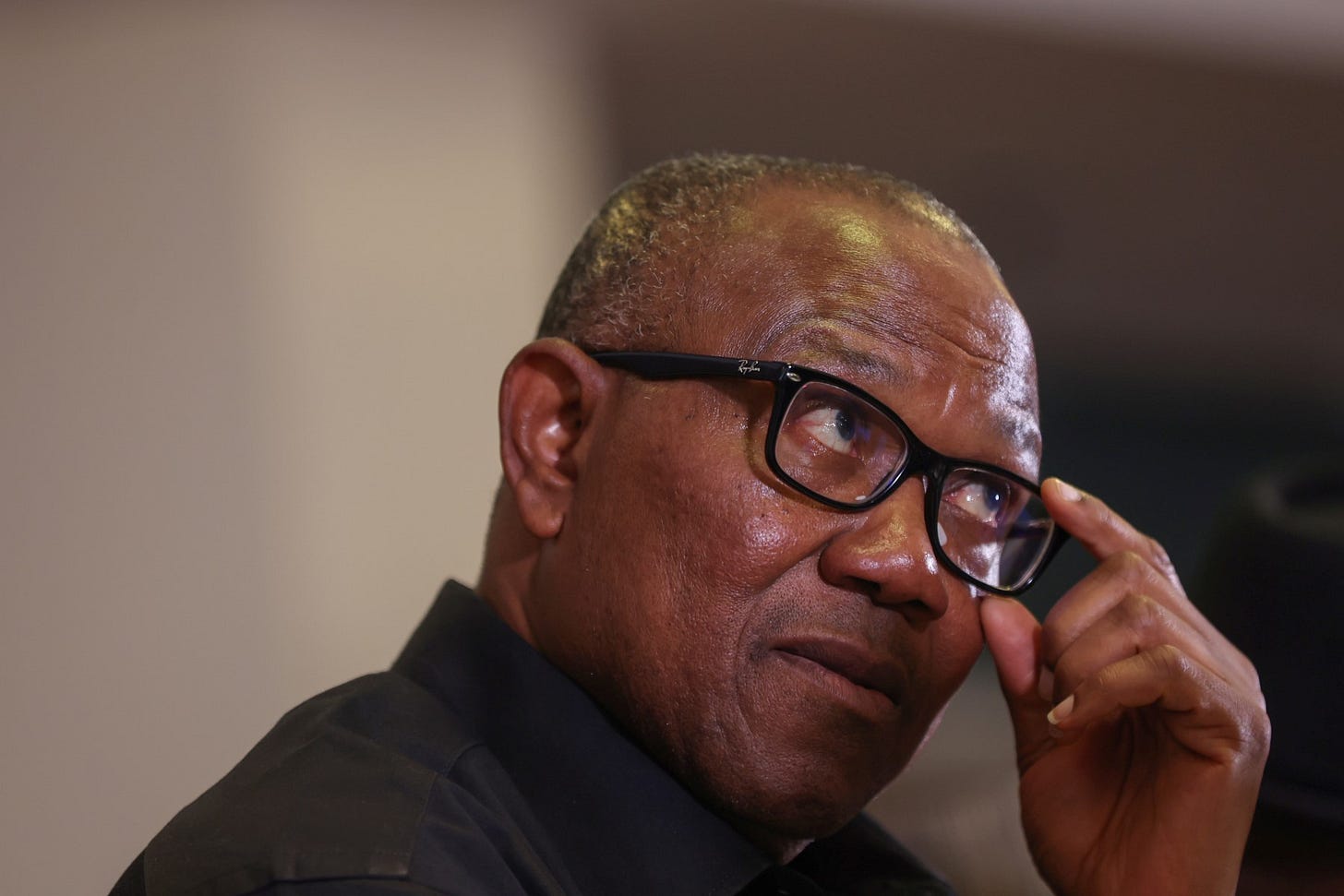Under Tinubu, essence of democracy eroded in Nigeria, says Peter Obi
By : John Akubo, Abuja
Nigeria's Labour Party Presidential Candidate, Peter Obi, adjust his glasses during a press briefing on the outcome of the 2023 Nigeria presidential and general election in Abuja on March 2, 2023. - Peter Obi announced on March 2, 2023 he would challenge the outcome of Nigeria's fiercely fought presidential elections after official results awarded victory to the ruling party's champion, Bola Tinubu. (Photo by KOLA SULAIMON / AFP)
Presidential candidate of the Labour Party in the 2023 elections, Mr. Peter Obi, has delivered a scathing Democracy Day address, accusing President Bola Tinubu of remote governance, economic mismanagement, and presiding over a democracy in retreat.
In a statement titled “Democracy in Decline: Reflecting on Two Years of Tinubu’s Governance,” Obi painted a bleak picture of the state of the nation, alleging that poverty, insecurity, and impunity have worsened under the current administration.
He criticised the President’s frequent foreign travels, arguing that they symbolize a growing disconnect from the hardships Nigerians face daily.
“Mr. President, you’ve made over 30 international trips in two years, spending nearly 150 days abroad. Touring the 36 states of Nigeria, even for just two days each, would take only 72 days—far less time than you’ve spent overseas,” Obi said.
According to Obi, Nigeria is fast losing its democratic essence. He lamented that “we’ve lost the essence of democracy—government of the people, by the people, and for the people. Today, rules are ignored, due process is bypassed, and unqualified individuals occupy public office through compromised processes.”
He urged Tinubu to follow the example of former Presidents Umaru Musa Yar’Adua and Goodluck Jonathan, who, despite political differences, made efforts to acknowledge flaws in the system and strengthen democratic institutions.
Obi presented a sector-by-sector assessment of what he described as national decline under the Tinubu administration. He said the GDP has plummeted from $364 billion to $188 billion—a 50 percent drop—while per capita income has fallen from $1,640 to $835.
He claimed the poverty rate has risen to 54 percent, affecting 129 million Nigerians.
In the education sector, he said over 18.3 million Nigerian children are out of school—the highest figure globally—and that students are taking science classes without laboratories and sitting for exams under candlelight due to poor infrastructure.
In the healthcare sector, Obi noted that fewer than 20 percent of the country’s 30,000 primary healthcare centres are functional. He cited a United Nations ranking that places Nigeria as the worst country to give birth in, with one death occurring every seven minutes.
On employment and industry, he stated that 7 million small and medium enterprises (SMEs) and 80 manufacturing firms have shut down.
He added that more than 15 multinational companies—including GSK, P&G, Shoprite, and Diageo—have exited Nigeria, citing operational difficulties and rising costs. Obi warned that soaring production and operational costs are crippling what remains of the country’s industrial base.
He also raised alarm over hunger and mental health, stating that Nigeria now ranks among the world’s hungriest nations. Citing World Health Organization (WHO) figures, he said 20 million Nigerians suffer from mental illness, while 59 percent of the population faces daily stress due to economic pressure and insecurity.
Obi accused the government of overseeing widespread corruption and unchecked borrowing.
He argued that despite the trillions of naira purportedly saved from the removal of fuel subsidies, the Tinubu administration has borrowed more in two years than the combined total of former Presidents Yar’Adua, Jonathan, and Buhari.
He described the 2025 budget as “a crime scene,” alleging that ₦7 trillion in questionable insertions had been uncovered by the civic watchdog, BudgIT.
He said there is no measurable impact of the government’s spending in critical sectors such as health, education, or poverty alleviation, adding that public funds are being mismanaged while propaganda has replaced effective governance.
Obi called for a return to transparent, accountable, and people-centered leadership.
“Nigeria is in decline. But we can rebuild by putting the people first, respecting democratic norms, and holding leaders accountable. We still have a choice between impunity and justice, propaganda and truth, failure and a better future,” he said.
GUARDIAN Newspapers



